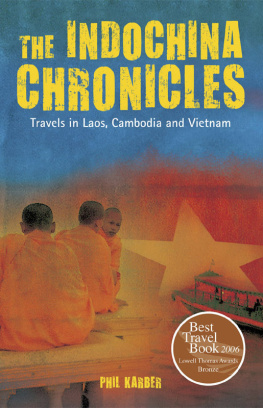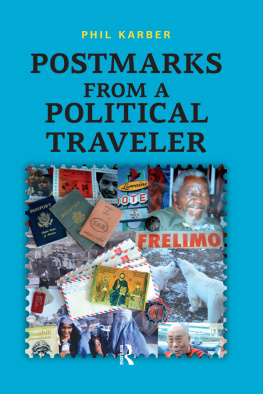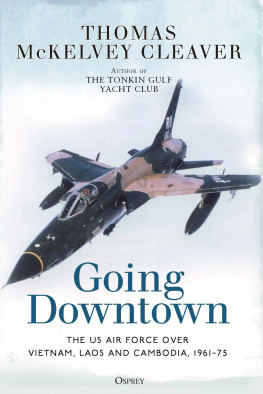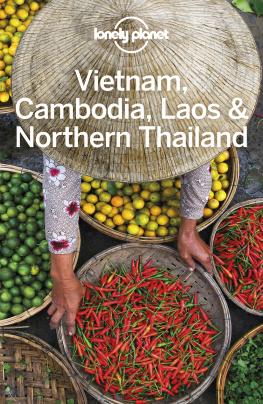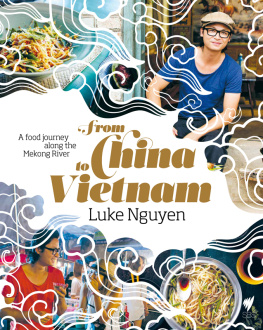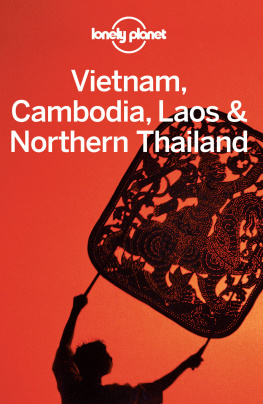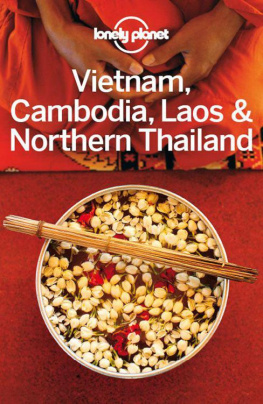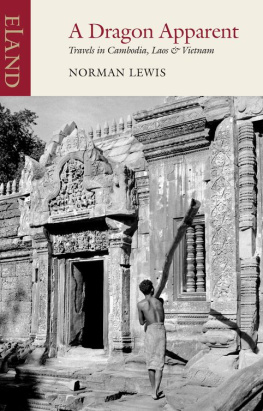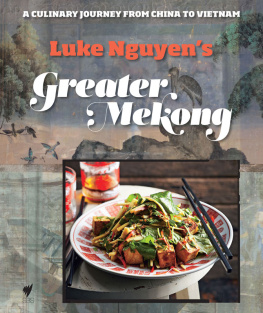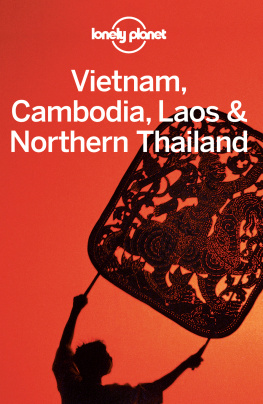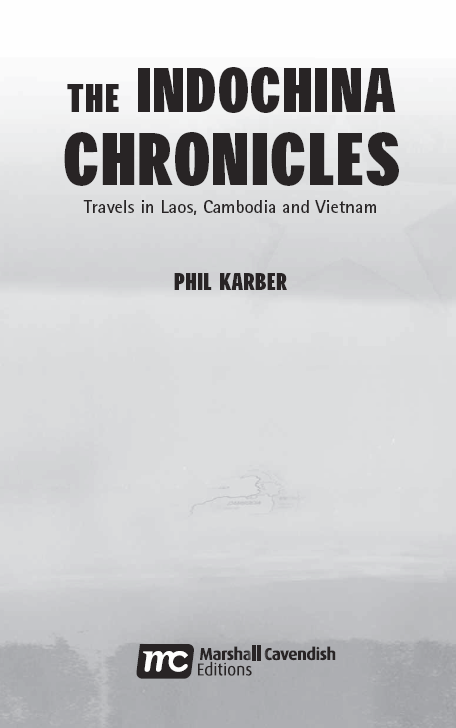
Copyright 2005 Marshall Cavendish International (Asia) Private Limited Reprinted 2007, 2010
Author: Phil Karber
Cover picture: Eric and Hoa Herter
Published by Marshall Cavendish Editions
An imprint of Marshall Cavendish International
1 New Industrial Road, Singapore 536196
All rights reserved
No part of this publication may be reproduced, stored in a retrieval system or transmitted, in any form or by any means, electronic, mechanical, photocopying, recording or otherwise, without the prior permission of the copyright owner. Request for permission should be addressed to the Publisher, Marshall Cavendish International (Asia) Private Limited, 1 New Industrial Road, Singapore 536196. Tel: (65) 6213 9300, fax: (65) 6285 4871. E-mail:
The publisher makes no representation or warranties with respect to the contents of this book, and specifically disclaims any implied warranties or merchantability or fitness for any particular purpose, and shall in no events be liable for any loss of profit or any other commercial damage, including but not limited to special, incidental, consequential, or other damages.
Other Marshall Cavendish Offices:
Marshall Cavendish International. PO Box 65829, London EC1P 1NY, UK Marshall Cavendish Corporation. 99 White Plains Road, Tarrytown NY 10591-9001, USA Marshall Cavendish International (Thailand) Co Ltd. 253 Asoke, 12th Flr, Sukhumvit 21 Road, Klongtoey Nua, Wattana, Bangkok 10110, Thailand Marshall Cavendish (Malaysia) Sdn Bhd, Times Subang, Lot 46, Subang Hi-Tech Industrial Park, Batu Tiga, 40000 Shah Alam, Selangor Darul Ehsan, Malaysia
Marshall Cavendish is a trademark of Times Publishing Limited
National Library Board (Singapore) Cataloguing in Publication Data
Karber, Phil, 1951
The Indochina Chronicles : travels in Laos, Cambodia and Vietnam / Phil Karber. Singapore : Marshall Cavendish Editions, 2007.
p. cm.
Previously published: Times Editions-Marshall Cavendish, c2005.
Includes bibliographical references and index.
eISBN : 978 981 4435 41 3
1. Karber, Phil, 1951- Travel Indochina. 2. Indochina Description and travel.
3. Indochina History 1945- I. Title.
DS535
915.9 dc22 SLS2006050543
Printed in Singapore by Times Printers Pte Ltd
To Joyce, Joellen,
Maggie and Parker
My sense is that cultures and individuals are subtler than their governments and actually are the only way we can make bridges between them. Governments are rooted in their ideologies and survive by keeping up the sense of us versus them. They have to have a keen sense of enmity; whereas many individuals dont have that. So thats one reason Ive become a great advocate of travel, especially for Americans. I think its dangerous in a global world to screen ourselves from realities.
Pico Iyer, travel writer, A Sense of Place.
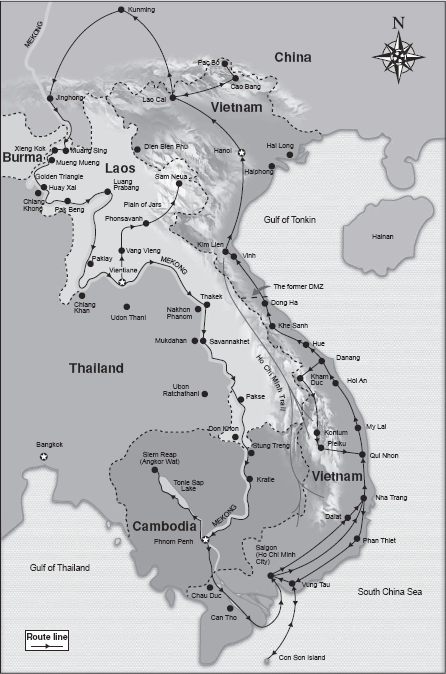
Contents
Prologue
The war in Indochina first touched me and my hometown of Fort Smith, Arkansas, in 1966, my sophomore year of high school. During a pep rally one Friday morning, the head football coach walked onto the field to present one of the teams outstanding former linemen, Charlie Belue, five years my senior. Until the coach said his name, no one recognized him. He was a shadow of his former robustness, after having taken just one wrong step in Vietnam, onto a landmine.
Old Belue didnt take the mike for a speech. He never was much of a talker, but that day his presence spoke volumes. Hobbling on crutches, he put his weight onto his right leg and new orthotic foot, with the left leg of his jeans folded back at the knee. The students applauded thunderously. He seemed embarrassed, though, by all this attention. I was transfixed, blanking out the cheers around me, my pulse racing in empathetic terror. If the war could do that to Old Belue, a natural born fighter, then we were all in for a heap of trouble.
Over the next two years I began to sense that I too would likely be sent to Vietnam. It was otherwise the happiest time of my life there in Fort Smith, a blue-collar town of 50,000 at the foothills of the Ozark Mountains, along the bluffs and banks of the Arkansas River. There were beautiful estates mixed with Babbit-style neighborhoods, sylvan hillsides and stream-fed valleys. Rodeo arenas, well-groomed baseball parks and football stadiums were hallowed ground, lighting up the nights with the magic of the Majis North Star. White church steeples fenced the horizons. With Cleaver-family conformity, the Karbers took pride in our prim slice of America.
The widening Arkansas River slips around the city in a light brown noose, cinched firmly with middle-America morals, and knotted loosely on the outer banks with old outlaw enclaves with names like Tenkiller and Shady Grove. Long ago known as Hell on the Border, Fort Smith was famous for its hanging judge, Isaac Parker. In the latter part of the 19th century, Judge Parker sent 79 outlaws to the gallows, thus a determined runner-up to Robespierres guillotine notches a century before. The judges whitewashed gallows are now enshrined as Fort Smiths main historical attraction, located just off Garrison Avenue, the frontier business district where five brothels operated openly throughout my rite-of-passage years.
About five miles from Fort Smith was a World War II army base, Fort Chaffee, where my father John Karber Jr. spent weekends training as a pilot in the Arkansas National Guard. He wore a uniform 30 years, both in the Guard and during World War II. He had a day job as County Agentthe local Mr. Green Acres.
On parade day at the end of the Guards summer training in the stifling heat of August, Governor Faubus would drive up from Little Rock, join the flag rank officers in the shaded reviewing stand, and fan his fedora while inspecting the troops as they marched to Sousa. Owing our livelihood to Roosevelts New Deal, my mother and father would line their five boys up in stair-step formation to shake hands with the defiant segregationist governor, himself a Democrat.
One of my first jobs was shining boots at 50 cents a pop for my dads officer friends during summer camp starting in 1960. After a few years of that easy money and several other summer jobs, I was a civilian KP (kitchen patrol) at Fort Chaffee, a job that paid $1.70 an hour for washing crusty pots and pans and peeling potatoes 12 hours a day, six days a week. It sounds like penance, but by all accounts at the time I had landed a plum job.
During those years, my passions were less for work, study and sports, and more for fast cars, whiskey and fast girls. My indulgences soon caught the attention of local police and school officials. Although I had been kicked out of school several times, and thrown in jail more often than that, my rebelliousness caught fire in 1968.
That same epochal year, rebellion and turbulence seemed to be sweeping all of America, even the planets far reaches. On January 23rd the USS Pueblo was captured by North Korean gunboats, a stunning escalation of the Cold War. A week later the Tet offensive swept South Vietnam. Many American bases were nearly overrun. The evening news broadcast play-by-play glimpses of fighting in the streets of Saigon and Hue. The body bags piled up. Militarily the Viet Cong and North Vietnamese lost heavilyup to 100,000 killedbut politically they may have won the war during those weeks following Tet.
Next page
